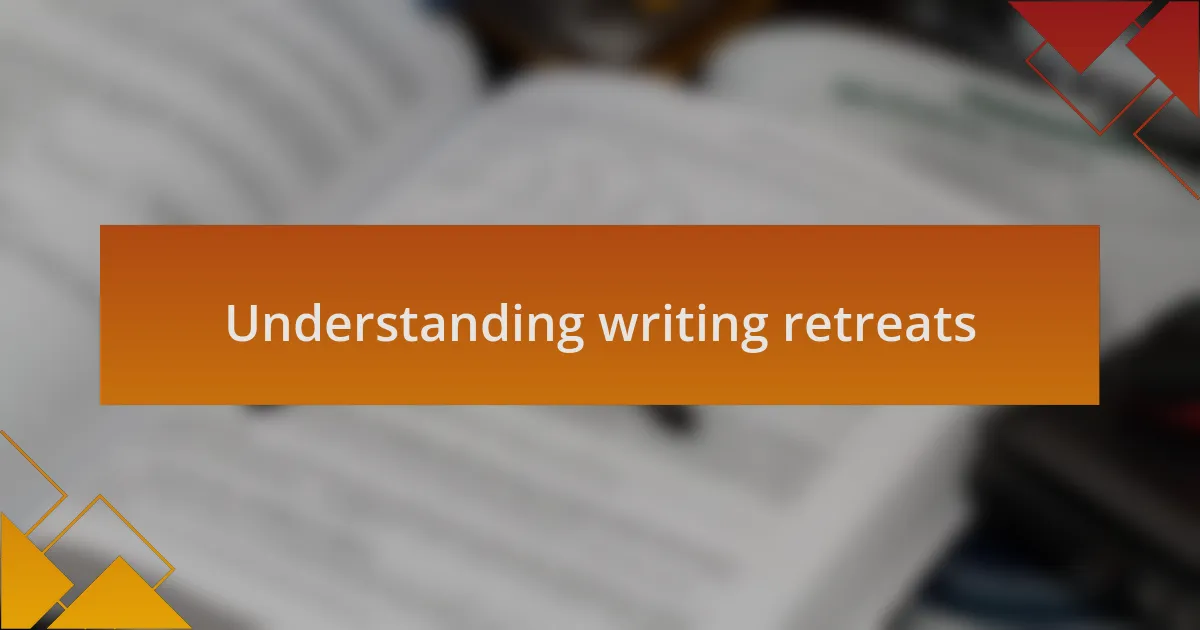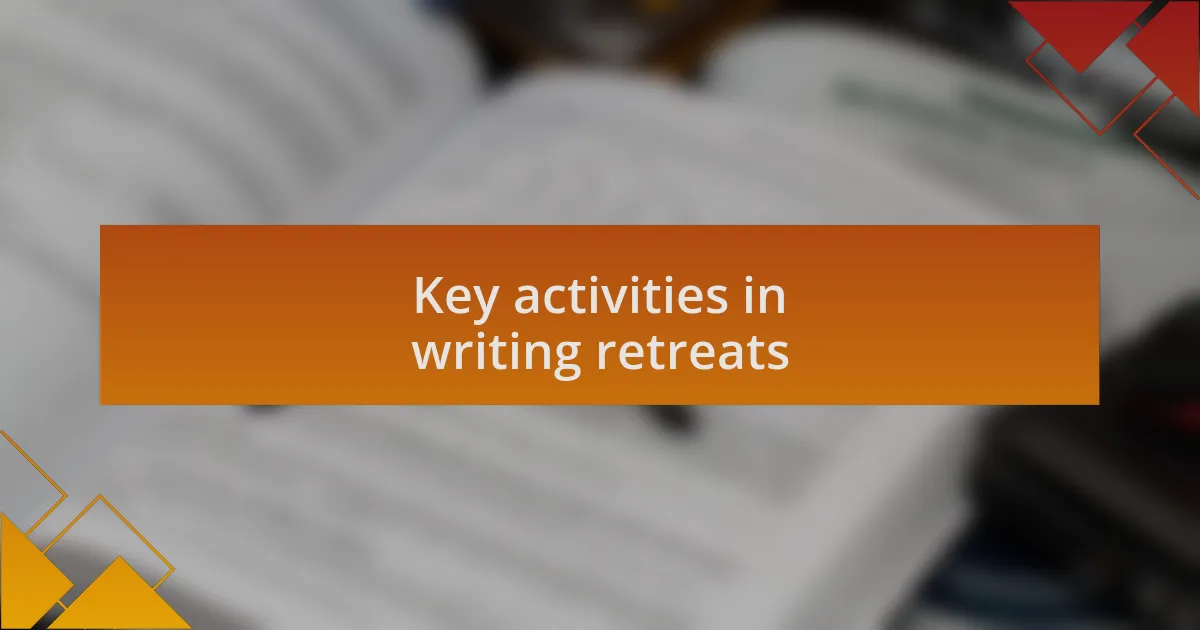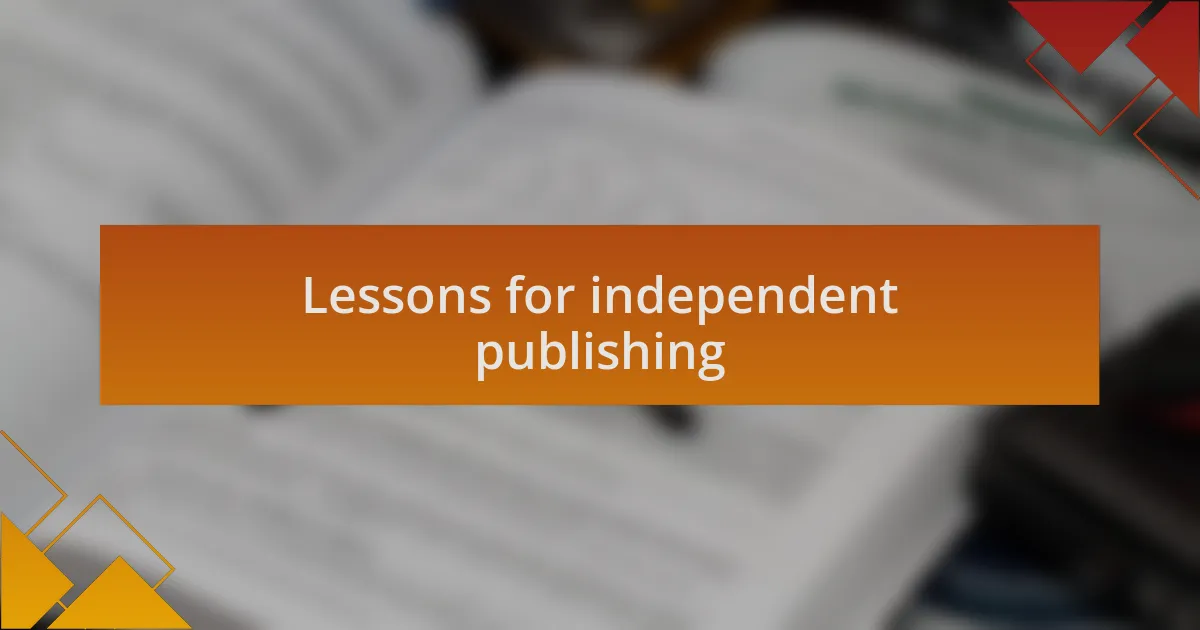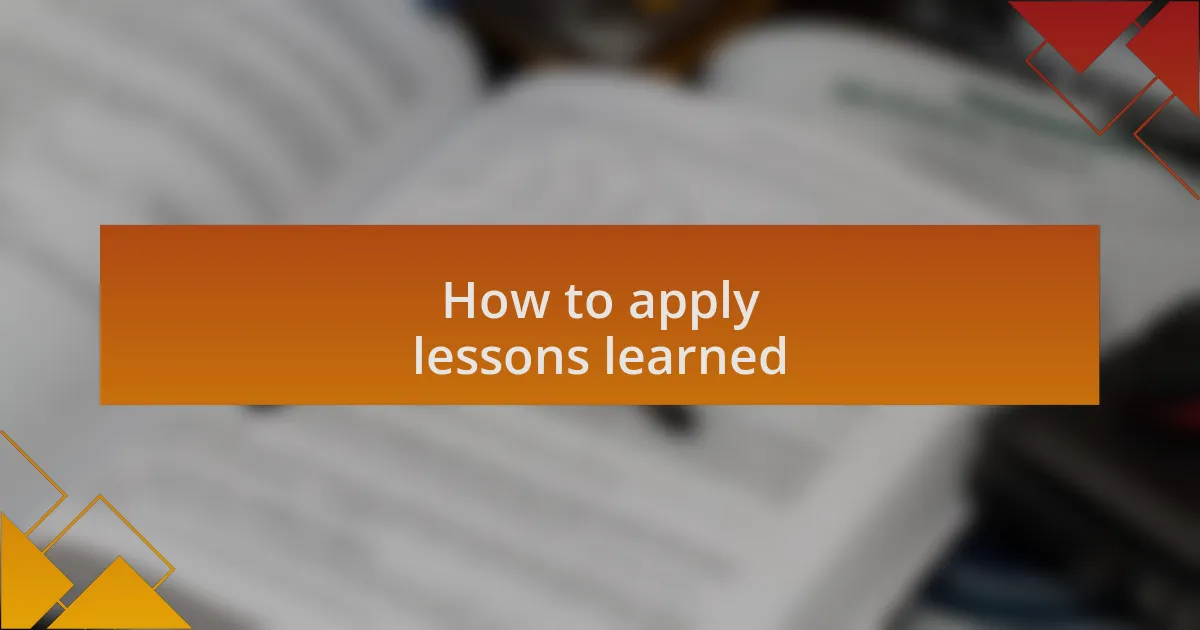Key takeaways:
- Writing retreats provide immersive, distraction-free environments that foster community, creativity, and personal growth among writers.
- Engaging in structured feedback and workshops during retreats enhances writing skills and inspires new ideas.
- Building supportive networks and embracing vulnerability can lead to deeper connections and authenticity in writing.
- Integrating lessons learned from retreats into daily writing practices, such as setting specific goals and revisiting drafts, is essential for ongoing development.

Understanding writing retreats
Writing retreats offer an immersive experience that can transform your craft. I remember my first retreat vividly—stepping into a quiet cabin surrounded by nature, I could feel the pressure of daily life slip away. It makes you wonder: How often do we give ourselves the space to breathe and just write?
These gatherings can be more than just a break from routine; they create a community of like-minded individuals. I forged friendships with fellow writers who understood my struggles and aspirations. Isn’t it powerful to find a tribe that not only motivates you, but also challenges your perspectives on writing?
I’ve often found that the structured schedule of a retreat—balancing writing time with workshops and feedback sessions—accelerates growth in ways that solitary writing cannot. It’s fascinating how just a few days away from distractions can lead to profound breakthroughs. Could engaging deeply with fellow creatives be the catalyst that elevates your writing from good to great?

Benefits of writing retreats
One significant benefit of writing retreats is the dedicated time they create for focused writing. I vividly remember setting aside my phone and other distractions, allowing my mind to dive deeper into my characters. Isn’t it remarkable how, with just a few hours of uninterrupted writing, ideas that had been simmering suddenly burst into clarity?
Another advantage is the opportunity for constructive feedback. During one retreat, I was apprehensive about sharing my work, but the supportive environment encouraged me to take the leap. Hearing different perspectives not only enhanced my writing but also sparked new ideas I hadn’t considered before. Can engaging critically with peers transform our understanding of our narratives?
Lastly, these retreats often rejuvenate our passion for storytelling. I recall a moment spent outside, surrounded by breathtaking scenery, when inspiration struck in waves. It reminded me of why I fell in love with writing in the first place—the sheer joy of weaving a narrative. How often do we give ourselves that chance to reignite our creative spark away from the daily grind?

Key activities in writing retreats
Key activities in writing retreats vary, but some of the most impactful are workshops and group discussions. I recall attending a workshop led by a seasoned author that transformed my approach to writing dialogue. The techniques we practiced felt both challenging and invigorating, leaving me energized and eager to experiment with my characters’ voices. Have you ever felt that surge of creativity from learning something new?
Reading sessions are another vital component. I distinctly remember sharing a draft of my story with fellow attendees, feeling both nervous and excited. The intimate setting allowed for genuine feedback, and hearing others’ interpretations of my words opened my eyes to different storytelling possibilities. What can be more rewarding than witnessing your work resonate with others?
Meditation and reflection time also play a crucial role in these retreats. I personally found solace in quiet moments spent outside, journaling about my writing journey. There’s something magical about slowing down and allowing thoughts to flow freely, providing clarity on what I wanted to express. Doesn’t every writer deserve that precious time to tune into their own thoughts and emotions?

Lessons for independent publishing
The most profound lesson I took away from my writing retreats is the importance of building a community. During one retreat, I witnessed how the bonds formed over shared experiences often led to enduring support networks for independent authors. Isn’t it incredible how a simple conversation over coffee can spark collaborations or friendships that last long after the retreat ends?
Another critical insight involves embracing vulnerability in our writing. I remember the moment I read a particularly personal piece aloud, my hands trembling as I laid bare my experiences. The connection I felt with the audience in that moment was both terrifying and liberating. How often do we hold back our true selves in our work? Allowing ourselves to be authentic can set our writing apart in the crowded independent publishing world.
Finally, I learned the value of staying adaptable. One weekend, an unexpected storm forced us indoors, and instead of canceling our planned activities, we pivoted to spontaneous writing exercises. That flexibility unlocked a different kind of creativity I hadn’t anticipated. Why should we stick rigidly to a plan when it’s the unexpected moments that often yield the richest insights? Embracing change can lead to unexpected breakthroughs in our writing journeys.

Personal insights from my experiences
Through my writing retreats, I’ve discovered that sharing personal stories fosters deep connections. One evening, as we exchanged anecdotes around a fire, I felt an overwhelming sense of understanding that transcended our differences. How often do we underestimate the power of vulnerability to create bonds that inspire our writing journeys?
I also learned that embracing individuality in our writing is crucial. During a workshop, I hesitated to share my unconventional approach to storytelling but decided to take the leap. When I finally revealed my style, the supportive feedback strengthened my resolve to write authentically. Have you ever held back from sharing your unique voice, fearing it might not resonate? Trusting that your perspective is valuable can be transformative.
Moreover, the experience of inviting constructive criticism was eye-opening. After sharing a draft, I expected harsh judgments but was met with insightful suggestions instead. I realized that welcoming feedback, even when it feels daunting, is essential for growth. Isn’t it fascinating how a simple change in perspective can turn fears into opportunities for improvement?

How to apply lessons learned
To truly apply the lessons learned from writing retreats, I’ve found that setting specific goals is crucial. After returning home, I committed to integrating the feedback I received into my daily writing routine. For instance, I aimed to write at least 500 words a day using the new techniques I learned. This simple goal turned into a transformative habit that fundamentally changed my writing process.
One of the most impactful strategies I embraced was the practice of revisiting my drafts with fresh eyes, something I gained from discussions with fellow writers. I remember vividly sitting down weeks later with a piece I once struggled with and discovering clarity where I initially felt confusion. Have you ever gone back to your work and seen it from an entirely new perspective? It’s like unlocking a door to creativity that I didn’t know was there.
Finally, I actively sought out writing groups in my local community to replicate that retreat environment. I shared my new insights and encouraged others to do the same. It was during these sessions that I began to see how collaboration can lead to a richer understanding of one’s writing. Isn’t it amazing how a supportive community can enhance our confidence and creativity? Embracing that sense of camaraderie has been instrumental in applying what I’ve learned and continuing my growth as a writer.

Recommendations for future retreats
When considering future writing retreats, I strongly recommend incorporating structured feedback sessions. In one of my experiences, we dedicated a few hours just to sharing critiques, and it was enlightening. The diversity of perspectives allowed me to see my work through a lens I hadn’t considered before. Wouldn’t it be beneficial for participants to have that space to grow together?
Secondly, I believe offering a mix of writing genres is essential. At one retreat, I stepped outside my comfort zone by attending sessions on poetry and screenwriting. This not only invigorated my creativity but revealed layers in my own writing style that I had never tapped into. Have you thought about how exposure to other forms of writing can enhance your voice?
Lastly, including mindfulness activities, such as meditation or nature walks, can profoundly impact a writer’s mindset. During one retreat, a short morning meditation transformed my entire day. It created a clearer mental space for writing and reflection, and I found myself more attuned to my thoughts and feelings. How do you think a calm mind could influence your creative process? Being present can open doors you didn’t even know existed.